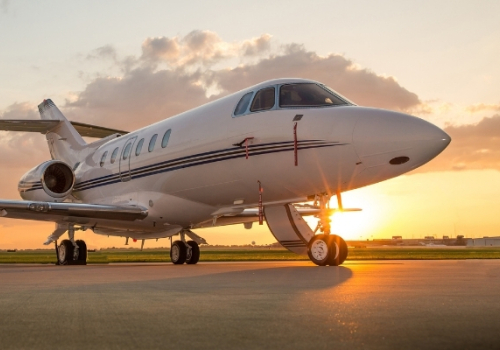
As the pandemic threatens to bring many businesses to their knees, what does the future look like for the business jet and superyacht industries? Will markets contract and change shape beyond recognition, or have COVID restrictions created unexpected opportunities?
While a handful of sectors, such as video conferencing, delivery services and PPE suppliers, have seen well publicised boosts to their revenue, many businesses associated with travel and hospitality have been fighting for survival.
Where does the world of private jets fit into this spectrum? Are business aviation companies – and related sectors like the superyacht industry - bracing themselves for a rocky ride for 2021 and beyond, or do some sectors see openings to generate vital income?
To find the answers, it's worth looking beyond the hype about what we've heard about superyacht owners. For instance, supposedly fleeing from the risk of infection and the imposition of restrictions by isolating themselves at sea. The reality for people working in our industries is much more nuanced, with the impact of COVID experienced quite differently across various sectors or even global regions.
“The business aviation industry in Asia is still relatively young compared to the US and Europe… the future looks promising for our industry in this part of the world,” says Vinna Tsang, Founder and Director of the V Executive Search Company. She points to how the pandemic has meant that consumers not just in Asia, but around the world, are waking up to the idea of chartering or owning an aircraft for safety and hygiene reasons.
The lower risks of infection associated with travelling via business jet is echoed by jet operators, who have reported an increased demand for their services since the crisis took hold. “From our perspective, the need for business aviation is there now more than ever” explains Tobias Laps, Executive VP Commercial of large VIP aircraft at Comlux. With the goal of providing an extra layer of health and safety, Comlux have developed and installed a system that allows the air on board to be ionised.
Not surprisingly, operators are frequently asked about their policies for testing crew. “One of the first questions new and existing customers ask relates to how often the pilots and crew take COVID-19 tests,” comments Julian Burrell, Chairman at Vertis Aviation. “We work with our crews to encourage them to have a document that highlights their latest test”.

(L-R) Vinna Tsang, Tobias Laps, Julian Burrell
It is not just the experience onboard an aircraft that can be fraught with fears of infection. Airports too can involve hours queuing with other travellers, increasing potential exposure to COVID.
Prior to the pandemic, even people with business jets at their disposal would have considered travelling first class on long haul flights, rather than taking using a company or private plane, as it was more efficient. Current circumstances have changed this pattern, at least for now. Business jets offer the opportunity to socially distance not only on the aircraft, but to enjoy more sparsely populated airport facilities too.
So, is taking a private jet during a pandemic really about being able to continue traveling while avoiding the risk of infection? For Tobias Laps, it's about responsibility. He explains, “When you're talking about companies that have thousands of employees, executives' time is worth so much more than what money can pay.” In other words, senior executives of major organisations have a responsibility to their employees, their companies and to society to travel safely and to remain healthy.
This begs the question of what will happen when it's all over? When the pandemic has finally become a footnote in history, will new converts to business aviation stay loyal to the sector or resume their former air travel habits in the first-class compartments of commercial airlines?
“Once you’ve flown privately it is hard to go back to commercial” However, he anticipates that the future resurrection of commercial networks will lead to a tapering-off in the “significant increase” they have seen in enquiries from new customers.
As new users enter the market, they need to learn how private aviation works. “Many have never booked charters before so we are working hard to help them maximise the benefits,” remarks Burrell.
Vertis have also seen an upward trend in the number of charters being flown, particularly in Europe and America, but also in Africa too. This has been accompanied by more activity in the light jet market, while the company is anticipating a resurgence in the heavy jet market.
Specialist recruitment companies point out that now is potentially an ideal time for business aviation and superyacht companies to explore the pools of great talent available for hire, where experienced staff have been laid off during the pandemic. Of course, not all companies will have the means to increase their headcount and therefore their overheads. But for those who report growing demand from some quarters, being able to snap up senior executives while they are available is a win-win situation. The industry is “hiring the right talents … to gear up for the demands when the pandemic situation around the world improves,” concludes Vinna Tsang.
As the world waits for a vaccine and quarantine rules remain unpredictable, the trend for increased private jet charter looks like it will endure. Given that many passengers don’t like wearing a mask for travel, this will drive new users to private charter, where mask wearing is not compulsory. Down the line, it will be down to individual countries, rather than aircraft operators, to decide who may need vaccination certificates as requirements for entry. It will certainly make travelling easier in the future if travellers have a certificate or, they may be required to show that they have been recently tested.
Although it has become increasingly difficult to predict when the world will emerge fully from the effects of the COVID-19 Pandemic, most in the business aviation and superyacht industries remain cautiously optimistic about the mid to long term future.
“People will want to come back to travelling no matter what,” sums up Tobias Laps of Comlux. “I don't think there will be a trend of people travelling less in the future.”
Find out more, join an expert panel, exchange ideas and network with others around the world.
Register here for the online conference on 25 September, 2020:
The Future of Superyachts, Business Aviation and Luxury Property.

Friday 25th September, 2020
Starting 11:00 - 18:00 CET
Lorna Titley is a Director at Quaynote Communications, a communications company specialising in PR & Marketing and Live / Virtual / Hybrid Conferences & Events for the Aviation, Maritime and Security Industries. 

Post your comment
You cannot post comments until you have logged in.
Login to post a commentComments
No one has commented on this page yet.
RSS feed for comments on this page | RSS feed for all comments